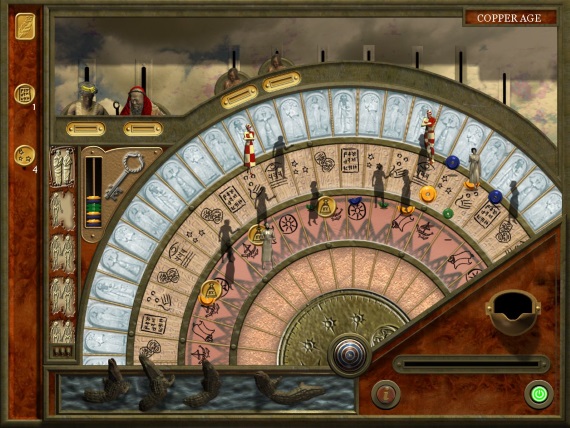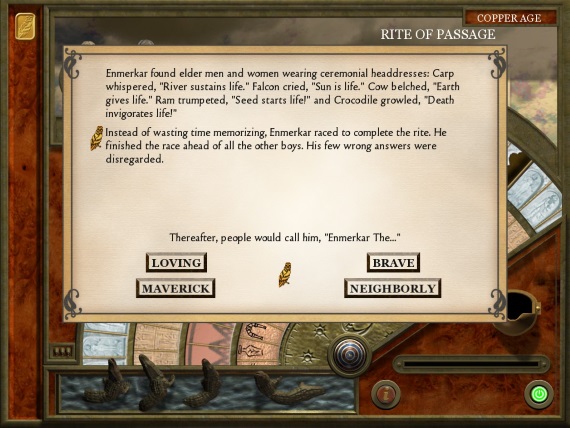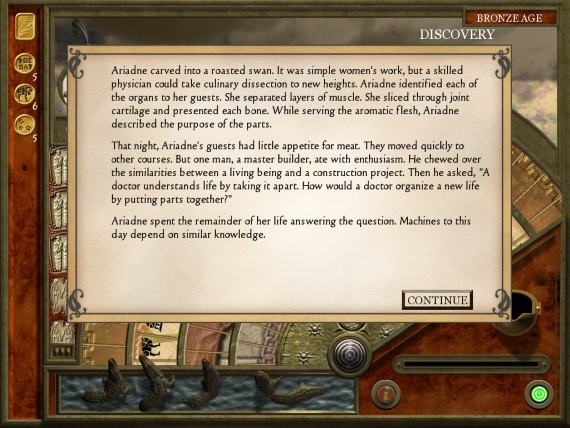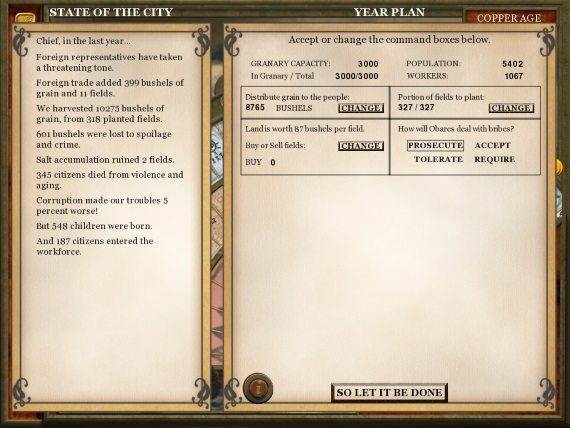
If you haven’t noticed the pattern on this blog by now, I like to intersperse playthroughs of lengthier, AAA games with shorter, indie production. I bought this one because the boardgame-like mechanics intrigued me. No surprise here, since it was made by the same company that made Dangerous High School Girls in Trouble! Its title is a real mouthful because it is only the first part of what is presumably a seven-part series.
- There doesn’t seem to a formal manual and the tutorial takes a learn-by-doing approach, so the rules were a bit confusing at first but they aren’t too complex. Essentially in this first step, you need to guide a family through three ages, the Copper Age (shouldn’t it be Stone instead?), the Bronze Age and the Iron Age. The wheel is constructed of four tracks, with each track representing a distinct caste, with labourers on the innermost ring and aristocrats on the outermost ring.
- It’s a turn-based game and you start each generation with a single peon to move, though the first order of business is usually to get a spouse so you have a second peon. Each peon has one action each turn and there are three choices: the default action is to pass and do nothing, which earns you a point in what I like to think of as a bank of research points; moving forward on the wheel by spending a token, which propels the peon onto the next stop on the wheel with a symbol that matches the token you spend, earning you a research coin if there is one on that spot; or move backwards on the wheel onto the next stop which contains at least one other peon, earning you tokens depending on how many other peons are on the same spot and the peon’s individual skills.

- At the end of each turn, the wheel turns and whoever is on the last rung is eaten by the crocodiles and dies. So essentially you need to spend tokens, which represent wealth, to constantly move ahead, but you can only earn tokens by moving backwards. Also, if you are out of tokens (i.e. dirt poor), alone and you are already in last place, you are basically fucked. There are some additional rules, i.e. enemies block you and allies and loving spouses boost you, but those are the essentials. If two spouses are on the same spot, they have a chance of having a child. Notice that the outermost track has many more spots than the innermost one, so labourers have to work harder to stay away from the crocodiles.
- Children don’t really have actions but you can try to put them to work to try to earn tokens. The success rate still depends on their skills but is pretty low. Instead, you usually want to invest extra tokens in them so their skills in that area improve, e.g. Currency, Plowing, Astronomy etc. By default, they just play and can learn a bit of stuff randomly. Eventually the current generation grows old and die, represented by the wheel coming to an end, and you need to choose one of the children to continue with. The child starts with whatever skills you managed to teach him or her, and a fair share of the family’s total wealth spread among the siblings.
- The more children you have, the most it costs to invest in their education and the less wealthy each child will be because the inheritance must be shared. On the other hand, random events will kill children, so more of them is an insurance policy. You may be tempted to invest only in the education of the eldest, in which case there is the danger not only of random death but the other siblings hating the favoured child and ending up as enemies in the future. Siblings also effectively represent saved games. If a generation dies out entirely with no heirs, you automatically go back up the family tree and continue with a sibling that you haven’t played yet. It’s really quite neat.

- Finally “research points” are accumulated for one of three purposes: to make an invention, which replaces one of the symbols on the track with a new one while giving your family a start in this technology in the form of skills and free tokens; to ascend up to the next caste, which is self-explanatory; and to attempt a heroic task, which is extremely risky and takes the form of a text adventure. There’s also an entirely separate ruling mini-game which you can engage in when you reach the highest caste but I confess that I haven’t spent much time on it.
- So how well does it play? Surprisingly well, it turns out. I was expecting this to be a really short game but it really is quite substantial and there is a fair amount of replay value too if you pay attention to the text-based stories. The boardgame mechanics are simple but sound enough to tempt you to keep playing for just one more generation. It’s worth noting that it isn’t a true boardgame since all kinds of simulations seem to be run behind the scenes to determine things like what other families are doing, so it really is a videogame with some boardgame-like mechanics.
- What is even more surprising is how emotionally affecting it is. For the purpose of this game, all that matters is that your family perpetuates itself, so a family member who never marries and never has children literally do not matter at all. Then there is the sense of loss of losing a child after investing so much in him or her. And the injustice of the upper caste beating down on you. And how you keep trying to save up a store of wealth for the next generation but thugs steal it away from you, over and over again. Then you die and leave what you have left to your children and they undergo the same fate. Brutal.
To be honest, I was more invested in the boardgame mechanics than in the text adventures so I merely skimmed through them during my first playthrough. There are still lots of things I don’t quite understand, such as how the ruling class mini-game works and how exactly success and failure during the rite of passage affects your fate. But as much as I like the ideas here I don’t think I’m interested enough to make it all the way through a second playthrough, let alone any future sequels which are supposed to directly build off of your saved games here. Judging from the news posts on the developer’s website, it appears that sales aren’t good and there are no immediate plans to start working on sequels. Still, some really cool ideas about narrative in games here.

Leave a Reply